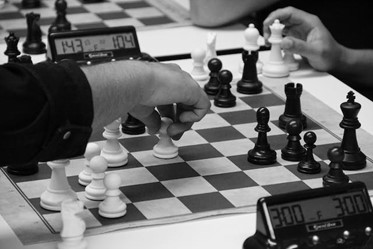
Imagine a world-champion chess player facing off against an amateur chess player. The grand master will surely win.
But now imagine that we’ve stacked the board against them. Their king is cornered. All of the powerful pieces have been captured or blocked. The amateur is just a move or two away from checkmate, and there’s nothing the grand master can do.

In such a position, all their brilliance and experience are useless, and the amateur will win.
Anyone who plays strategy games (or pretty much any sport) knows the importance of position. Talent, skill, knowledge, intelligence – these things matter – but they often matter less than putting yourself in the right position on the board or field of play.
And (you knew this was coming) in playing the game of life, position is even more important.
There are aspects of position that are outside of your control: the economy, the historical and cultural circumstances of your life, the privilege (or lack thereof) you were born into.
But there is a great deal you can control. And optimizing your position is arguably the most powerful strategy for thriving in life.
Why Position is the Key to Success
“Over the long term, the average person who constantly puts themselves in a good position beats the genius who finds themselves in a poor position.” –Shane Parrish1
Shane Parrish is an excellent blogger, podcaster, and author who writes often about the importance of positioning yourself for success. Too often, he argues, we focus on being smart or talented when we should really be focused on setting ourselves up to have better options in the future via good positioning.
By positioning, he means things like:
- Being prepared for unexpected problems, so you can handle them with grace.
- Having the means (time, energy, money) to capitalize on unexpected opportunities.
- Avoiding bad habits that create major problems down the road.
- Creating a lifestyle that expands the number of good options you’ll have in the future.
“The position you find yourself in determines the options available. Almost all the options available are positive when you put yourself in a good position. When your position is bad, however, almost all the options available are negative.” –Shane Parrish2
When you find yourself in a good position, you have more power and freedom. On the other hand, few things feel worse than finding yourself in a position where all of your options are bad.

From a good position, success is easy. But from a bad position, success is often impossible.
So with that in mind, let’s look at nine strategies you can use to improve your position.
1. Start Early
If you start prepping dinner early, you can still get it done on time if it takes longer than you expect. If you leave the house early, you can still arrive on time if there’s unexpected traffic.
If you start your project early, you’ll have time to change things, fix things, and improve things. Plus, you won’t be rushed, so your initial work will be better anyway. But if you procrastinate, you’ll have to do the work at the last minute, so you won’t be in a position to do your best work.
(If you want to learn how to overcome procrastination, read this.)
2. Create Slack
One of the reasons procrastination puts you in a bad position is that it doesn’t leave any slack in your schedule. Slack refers to having time, money, and energy to spare. It’s a buffer against unforeseen problems. Having slack in your days, in your budget, and in your health positions you to have better options.
“Systems with slack are more resilient. The few extra minutes of time aren’t wasted, the same way that a bike helmet isn’t wasted if you don’t have a crash today. That buffer will save the day, sooner or later.” –Seth Godin3
So don’t overschedule yourself. If you have no time to spare, you’re in a bad position. If something unexpected comes up, you’ll be forced to sacrifice something important on your calendar to deal with the crisis. If an amazing opportunity arises, you probably won’t be able to take advantage of it.

And don’t overreach financially. Taking the biggest loan the bank will give you. Maxing out your credit cards. Spending more than you earn. Not saving for a rainy day. Putting all your money into high-risk investments. This kind of thing can put you in a bad position if you have unexpected bills or a loss of income.
Lastly, don’t push your body to the limit. I used to do this in two ways: I overexerted myself physically playing sports, which led to injuries, and I overindulged in drugs, which led to health and mental health problems. Moderation puts you in a better position.
3. Never Stop Learning
After college, I became a ski bum/bartender – not exactly the ideal long-term career choice. But I did keep learning. I read about history and biology. I took online psychology courses. I practiced math. I wrote and taught classes for fun. So when I got hurt and could no longer work on my feet, I found myself in an excellent position to become a tutor and blog writer.
Continuous learning can allow you to weather storms and change direction when you need to. It positions you to capitalize on career opportunities and keep up with technological changes.
And perhaps more important than any particular knowledge you gain, learning often maintains your ability to learn. In a world that’s changing quickly, being skilled at the meta-skill of learning positions you for long-term success.
4. Cultivate Wisdom
One type of learning that’s often overlooked is wisdom. I have found that consuming a bit of wisdom each morning sets me to think better and make better choices throughout the day. And, over the long run, this practice has had a bigger impact on my life than any other habit.

Cultivating wisdom positions you psychologically to handle life’s inevitable challenges – from daily upsets to major setbacks and tragedies.
(If you’re not sure where to go for a daily dose of good ideas, try Heroic or The Daily Stoic.)
5. Invest in Your Health
Eating well, exercising, and getting enough sleep put your body and your mind in a position where thriving is easy. You’ll feel better, think more clearly, and have more willpower.
Investing in your health also creates a buffer when things go wrong. If you get sick, you’ll get less sick and recover more quickly. If you get hurt, you’ll have more strength in reserve, so you’ll be less debilitated and heal more quickly.
Make time for rest and recreation, so you have energy to spare. This puts you in a better position to handle an unexpected challenge, a poor night of sleep, an extra long work day, or a very stressful situation. Burning the candle at both ends is a great way to get burned – and burned out.
6. Strategically Craft Your Environment
One of the best ways to position yourself for success is to set up your environment so that good choices are easier.
- Fill the fridge and the pantry with healthy food.
- Keep junk food out of sight or, even better, out of the house.
- Create dedicated spaces for reading, meditation, stretching, and exercise.
- Have books, games, and puzzles around to provide an obvious alternative to digital entertainment.
- Populate your phone’s home screen and your browser’s favorites bar with productive, non-addictive options (e.g., Duolingo instead of TikTok).
- Use mise en place to improve the efficiency of your workspaces.
A well-crafted environment positions you to naturally move toward an even better position, making it easier to build positive momentum.
7. Play The Long Game
“Not doing the obvious thing you know you should do — the thing that positions you for future success — rarely hurts you right away.” –Shane Parrish4

Most of the time we find ourselves in a bad position of our own making, it’s because we chose short-term benefits over long-term advantages. Staying up late to watch another episode. Indulging in a second helping of dessert, just this once (for the tenth time this month). Going out to eat because it’s easier than cooking, even though it’s way more expensive.
When you have the choice of getting a short-term gain or improving your long-term position, it will always be tempting to take the short-term gain, but that’s human nature getting the better of you. We live far longer, safer lives than our hunter-gatherer ancestors, so we need to do more long-term planning than they did – more than we’re naturally inclined to do. The modern world rewards delayed gratification (even as its marketers inundate us with instant gratification temptations).
Other times, we lack the patience to make the investments that will accumulate and compound over time. We want results right now, but we can’t have them, so we don’t put in the work. Or we do the work for a few days and then give up because it’s taking too long. (See: nearly everyone who tries to lose weight.) To make real, meaningful change, you have to play the long game.
Speaking from deep personal experience, it takes a long time to heal from an injury. But time alone isn’t enough – you also have to do your physical therapy homework. You have to commit to the process and stick with it until you regain your strength and mobility.

Or take meditation. Meditating for a few minutes won’t make much of a difference, but meditating for a few minutes every day for years will have a profound effect on your patience, ability to focus, and overall sense of well-being.
“The position you find yourself in today is the accumulation of the small choices that you’ve been making for years.” –Shane Parrish4
So think long term.
Where do you want to be in a decade?
Start walking that path today and, critically, keep walking it day after day, year after year.
8. Invest in Relationships
One of the hardest – and most important – places to play the long game is in your relationships.
When someone you care about is struggling, it’s tempting to just tell them what to do, but (unwanted) advice rarely has the effect you think it will. It’s slower – but far better – to ask questions, listen, and lead by example.
Build credibility by living with virtue. Take the high road over short-term gain. Happily give more than you take. Choose being happy over being right. Be patient and forgiving.
Being surrounded by people who love and support you is a great position to be in.
9. Plan for Problems
“In May of 2019, AT&T did something that, at the time, must have seemed a little ridiculous to even some of its own employees. The company, as The Atlantic reported, ‘ran an internal war game on how a pandemic would affect its ability to keep phone and internet service running.’ …
Then in early 2020, as COVID-19 was making quick work of businesses, government agencies, and supply chains, AT&T, despite record broadband usage, handled the surges and kept the internet running. Because they had challenged themselves when things were calm, they were able to handle the storm when it came.”5
Don’t let calm, easy times lull you into a false sense of security. Bad things will come, so you’d be wise to prepare for them. This is the reason for fire drills and CPR classes and first aid kits. This is the reason I engage in discomfort training – so that I’ll be ready to handle the pain I don’t get to choose.
“We should put ourselves in the position, as Epictetus said, to be able to greet adversity with the expression, ‘You are precisely what I trained for.’” –Ryan Holiday5
Being prepared for problems is a much better position than being caught off guard. So ask yourself, “what if …
… I lose my job?”
…. I get hurt/sick?”
…. there’s an earthquake?”
…. there’s a (another) pandemic?”

Even when you’re setting a goal for the future, assume some things will go wrong. Imagine what obstacles will arise and plan how you will overcome them.6 This exercise greatly increases your odds of success.
How Will You Position Yourself to Thrive?
Imagine yourself in a position where success is easy – where you’re well-situated to thrive personally and professionally.
Now, think about the gap between what you’ve just imagined and your life today.
What needs to be different?
What do you need to start doing (consistently) to position yourself for a better life in the coming decades?
What small changes can you make today that will improve your position tomorrow?
1 Parrish, Shane. “Unlocking Your Potential: Doing Your Best.” Farnam Street.
2 Parrish, Shane. “No Points for Difficult.” Farnam Street. Brain Food No. 478. June 26, 2022.
3 Godin, Seth. “Investing in slack.” Seth’s Blog. June 15, 2019.
4 Parrish, Shane. “The Small Steps of Giant Leaps.” Farnam Street.
5 Holiday, Ryan. Daily Stoic Newsletter. Dec 12, 2023.
6 Johnson, Brian. “PNTV: Rethinking Positive Thinking by Gabriele Oettingen.”
